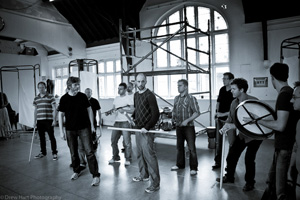In Closing, An Open Letter to Propeller Theater Company
I will be frank with you: I was hoping to have my world rocked when I walked into your shows this week. I’d heard so much about you, lectures and my brother and my professor and the you tube trailers and the information on the UMS website. You seemed like just the type of company for me. And let me tell you, you fulfilled all of my twenty-two-year-old drama-English-music-geek dreams. You are a company of talented, passionate, dedicated, vocally gifted, really good looking men who make Shakespeare into something brand new while somehow getting closer to the root and core of the text than any production I’ve ever seen.
In short, I wanted my world to be rocked. And rocked it was.
But, see, I’m not all that important. And it’s not because I’m young. It’s not because I’m not a big theater critic, or I’m not some CEO who can fund you. God willing, one day I’ll have the swag to fund the arts the way I think they should be funded. I’m unimportant because you didn’t have to win me over. I already love Shakespeare.
What makes YOU really important Propeller, is not that I, a lover, was rocked. What makes you important is that all the people who are lukewarm about Shakespeare, or don’t know Shakespeare, or who just downright don’t LIKE Shakespeare, are suddenly curious.
I’ve rarely seen an Ann Arbor audience so receptive to pure slapstick and tomfoolery. We’re a stuffy liberal town generally, mixed in with the conservative elements from the surrounding areas who come in for the shows and the restaurants. But there they all sat, two older women in front of me enjoying the performance just as much as I was, as much as my mother (in from the suburbs of Detroit) was, as much as the two women who were sitting next to me speaking in French during the intermission, as much as the younger men with their dates in the front row who got pulled into the action.
Oh I’m sure some people walked out in the middle of the performances insulted, or rolled their eyes, or thought the naked man with a sparkler up his rear was just tasteless. But those, I think, were much fewer and farther between than those of us who absolutely loved what you were doing up on that stage.
Because really, it’s not everyone who can take a piece of history and make it live again. It’s not every company that can keep an audience so riveted that they watch you perform in the lobby at intermission as well as on the stage for two hours. It’s not just anybody who can take a play centuries old and plant it in our heads like it just happened, like we just heard this news, this story, today.
I already love Shakespeare, and it was obvious when I watched the shows you presented. But what was really extraordinary was that I didn’t feel alone in my unashamed and vocal enjoyment of the show. I felt, for one of the very few times in my life as an audience member, as essential to the show as the company was. And as much a part of the group of the audience, as you are Propeller, within your incredibly close knit company.
There are few things more beautiful than watching people around me discover Shakespeare. My own aunts were asking me their questions at intermission and pronounced the production “wild,” at the close, wishing they had been able to see Richard as well.
Which is exactly as it should be Propeller – they should all want more when they leave. Like any brilliant piece of art, they should still be thinking, feeling, reacting, after they walk out the door. It should stick with them. Haunt them like Richard, make them smile like Comedy, explore some part of their humanity like Shakespeare always always does. Anyone who sees this production is thinking, Propeller, where have you been all my life, for I ne’er saw true Shakespeare till this night!?
And that is simply beautiful. There will always be Shakespeare lovers like me. But many of those people who saw you this week will be thinking about Shakespeare in an entirely new way. That is something incredible.
So, my dear Propeller, take this as a open invitation from Ann Arbor. We send our love, our appreciation, and above all our gratitude. A good theater company is hard to find, but you certainly fit the bill. It was an absolute pleasure to have you. Now, come back soon, hear?
Sincerely,
Jen Leija (blogger and adamant fan)
Richard III Recap: Taking Sides
 We generally do not side with the homicidal maniacs of a given story. For example, we may see Iago’s point of view in Othello, but in the end, after all he does to ruin the lives of those around him, do we really feel all that sorry for his arrest and eventual torture?
We generally do not side with the homicidal maniacs of a given story. For example, we may see Iago’s point of view in Othello, but in the end, after all he does to ruin the lives of those around him, do we really feel all that sorry for his arrest and eventual torture?“The Boys” Are In Town
So I’ve basically been given everything I ever wanted from life: a group of British men, playing Shakespeare, just for me.
That is to say that I got to sit in on Propeller’s cue-to-cue rehearsal Wednesday afternoon before attending the opening night of Richard III. And really, Shakespeare is just so much more legitimate with British accents.
I don’t yet know Richard well enough to say if their craft will be excellent, but there is one thing I can speak to – the sheer, brilliant togetherness of this group of men that makes me think Professor Rutter’s earlier insistence of the troupe as “The Propeller Boys” and “The Pack” is based entirely on fact.
They move like a unit, from ensemble to individual part and back again. Collaboration is everywhere, from “I thought I might stand there,” to “a little more upstage please, because the house is so wide,” each actor having a say in where he goes and knowing exactly why. The equality between directors, techs, and actors is evident in the mutual respect with which direction and suggestion are given and received. In the brief moments when the actors aren’t marking their cue-to-cue, it becomes clear that the ensemble is working as a single unit, a single entity never missing a beat, bringing individuals out of its midst, but always, always returning to the ensemble state, the troupe, which is so much more important than each individual part. They work as a seamless whole putting the focus where it should be : on The Story. The Journey. The thing the audience really comes to live through.
They are comfortable. They are professional. They are, even while marking, a clearly talented group of actors. If I’m any judge at all of the various instruments of torture hanging from the set pieces, I imagine Wednesday evening will be a brutal experience. At this point, the only thing I’m sure of is that “The Propeller Boys” are sure not to disappoint.
A new kind of Shakespeare?
The very British, and very emphatic, Professor Carol Rutter of University of Warwick presided over Monday evening’s lecture festivities (“An Introduction to UK’s Propeller Company”) at UMMA. And I must be completely candid – my first thought was that I was definitely the youngest person in the room. In a crowd of 40 plus people, my 22 years old was a drastic change from a median age of 45. But it’s clear from the presentation that followed that UMS and indeed, Propeller, is a new rather than an old look at Shakespeare.
Looking at the presentation of photographs behind Rutter, I’m already entranced with the visual extremes to which Propeller seems to go. Blood splattered on the stage, half-masked faces, sparkling red heels on a devilishly smiling actor. An entire set in twenty small suitcases. I caught a few comments about the goal of Propellor as a company that “would build the set with people,” that had “the ability to travel light and tour anywhere.” But what stopped me entirely was Rutter’s statement about the type of theater I was about to see. She said it was playful, as I personally believe Shakespeare should always be. That it was demystifying, as I wish all Shakespeare lovers would believe it should be. And then she said that it was, “Frequently dangerous, always disruptive … and constantly provocative.”
And that, my dear friends, is just exactly what Shakespeare is.
Shakespeare is also the raucous run of an all-male stage – which Propeller embodies with the actors who call themselves ‘the Propeller boys’ and ‘The Pack’. Professor Rutter spoke about the somewhat controversial all-male make up of the company after which I asked a brief question about whether this persuasion seemed to alienate female theatergoers. The negative answer in itself was not as fascinating as her explanation: that men playing women allows the men to be brutal in ways they cannot be with female actors and that it frees a woman from being the paragon of theatrical beauty, talent, and grace, taking on the many abuses that Shakespearean women undergo. Perhaps the most staggering moment of this explanation was Professor Rutter’s insistence that the breaking of the fourth wall is pivotal in Propeller’s productions. Simply, that men playing women is not the biggest leap of imagination we all take when we go to the theater, and that if we trust the actors, their craft and skill and dedication, to entertain us, then we will be glad to see actors acting rather than imagining them to be the characters they portray.
Since the first question after the end of Professor Rutter’s presentation was about whether the company edits the original text or not, I can’t imagine everyone is excited to see the gritty, controversial, upcoming productions of Richard III and Comedy of Errors. But as an unconventional (read: young) lover of theater, the English language, and the incredible combination of the two in Shakespeare, I can unequivocally say that I am.



